|
|
|
Sort Order |
|
|
|
Items / Page
|
|
|
|
|
|
|
| Srl | Item |
| 1 |
ID:
152943


|
|
|
|
|
| Summary/Abstract |
This chapter argues that in the case of the EU’s efforts to undertake a “Pivot to Asia”, added explanatory salience can be achieved by recognising firstly the importance of the transatlantic factor and the US’ own rebalance policies. Secondly, based on a model where the USA is regarded as a significant variable in the EU-China relationship, one may more saliently discern the influence of Russia by assessing its impact on the triangular EU-China-US relationship, both directly and indirectly. Addressing these issues in European policymaking, the chapter will be constituted of two main parts. In the first section, the triangular nature of European foreign policies towards China is introduced, addressing the transatlantic factor in EU-China relations. Based on research on the European policy debates on EU’s Asia policies and the American Pivot to Asia, the section will illustrate the degree to which EU policy initiatives are conceived as playing out on a range from cooperation to competition with the US’ rebalance initiatives. In the second section, the chapter will proceed to investigate a factor that is affecting, although to different degrees, all three corners of the triangular political context in which European China policies are being shaped, namely the effects of recent Russian actions in the Eurasian theatre. The analysis demonstrates how European policymakers struggle to define their place in the EU-China-US triangle. The dynamics of the ongoing Asian power shift highlights the dilemmas for the European continent, as it seeks to balance its relations in a shifting geopolitical landscape.
|
|
|
|
|
|
|
|
|
|
|
|
|
|
|
|
| 2 |
ID:
152944
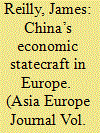

|
|
|
|
|
| Summary/Abstract |
China’s economic statecraft in Europe relies upon three distinct strategies: specific and diffuse reciprocity, and strategic engagement—each designed to advance a specific type of policy objective. However, the tensions between a reciprocity and engagement strategy have undermined China’s efforts to reassure Europeans of Beijing’s benevolent intent. This article compares Beijing’s three strategies through case studies of China’s efforts to discourage European receptions of the Dalai Lama, secure market economy status, and Beijing’s response to Europe’s post-2009 financial crisis.
|
|
|
|
|
|
|
|
|
|
|
|
|
|
|
|
| 3 |
ID:
152942
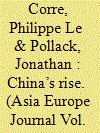

|
|
|
|
|
| Summary/Abstract |
This essay examines and evaluates China’s global rise and the state of the transatlantic discussions about this issue. Since 2010, the rise of China has been accompanied by multiple Chinese initiatives on the international front, especially in the fields of trade and investment. Chinese overseas direct investments are on the rise at a global level. The creation of the Asian Infrastructure Investment Bank, of the Silk Road Fund, and of the “Belt and Road” initiative are signs of a much more assertive China that is now engaging Western countries, including Europe and the USA. Western reactions, both at governmental and grass-root levels have been mixed. Two questions emerge: can Europeans agree on a common policy toward China? And can the USA and the European Union pursue a dialog and a more coordinated strategy? This will be especially relevant in the context of President Donald Trump’s administration as well as newly elected governments in France and Germany following general elections in these countries in 2017. The future of a transatlantic dialog should also encompass the British question when the UK leaves the EU. As the USA and leading European countries map their foreign policy strategies in coming years, there is a need to elevate policy coordination toward China in the hierarchy of political and economic goals. The paper offers some suggestions on possible priorities.
|
|
|
|
|
|
|
|
|
|
|
|
|
|
|
|
| 4 |
ID:
152948
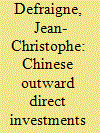

|
|
|
|
|
| Summary/Abstract |
This article will adopt a long-term perspective on the possible evolutions of the respective role of China and Europe in the global division of labour and in international trade and how it affects the flow of Chinese outward direct investments in Europe. The Chinese leadership has been pursuing an active industrial policy to enable its national champions to move up the value chain and challenge the European incumbents. In that context, Chinese authorities have been fostering strategic asset-seeking outward direct investments by Chinese firms in the European Union to capture technology and management know-how by taking over European enterprises weakened by the crisis. This new challenge affects very differently the various European Union member states according to their level of technological development and their role in the regional division of labour between the economic centre and the periphery of the European Union. This analysis will explain the evolution and distribution of Chinese outward direct investments in Europe and provide elements for a prospective analysis of this phenomenon.
|
|
|
|
|
|
|
|
|
|
|
|
|
|
|
|
| 5 |
ID:
152947


|
|
|
|
|
| Summary/Abstract |
The European Union (EU)’s trade strategy has changed since 2015 with the re-introduction of human rights and the EU’s refusal to grant China Market Economy Status. The questions under investigation here are what were the drivers of EU-China trade before the strategic turn and what consequences could the new EU strategy bring about in the relationship. The paper will draw from 16 interviews with think tanks and policy makers carried out in Beijing and Brussels in 2015 to uncover the Chinese perceptions of the EU and its diplomats as well as the preferences that have so far pushed China to make the EU one of its first trade partners. This work concludes that in order for the EU-China trade relationship to keep functioning, the new EU strategy towards China needs to keep human rights as an issue separated from trade, needs to boost knowledge and legislation transfers on sensitive issues like food safety and environmental management and finally needs to keep the “European way” of dealing with trade frictions and disputes with China.
|
|
|
|
|
|
|
|
|
|
|
|
|
|
|
|
| 6 |
ID:
152941


|
|
|
|
|
| Summary/Abstract |
How should Europe respond to China’s growing economic and military capabilities, and to the more assertive foreign policy behavior it has generated? Should it seek to check or even resist China’s rise, or should it instead rely on a strategy of engagement and accommodation? Three distinct and coherent strategic visions exist that could guide Europe’s policy and strategy toward China and the Asia Pacific over the next 10 or 15 years. These range from narrow commitments to Europe’s own security and material prosperity to more ambitious and expansive efforts to shape and influence events in the Asia Pacific. These three strategic visions are (1) balancing, (2) engagement, and (3) retrenchment. After outlining and evaluating each strategic vision, this article then offers a brief review and analysis of Europe’s current approach toward China, which is a hodgepodge of engagement and retrenchment. The article concludes by examining what might cause Europe to pursue a clearer and more consistent strategic approach toward China in the years ahead.
|
|
|
|
|
|
|
|
|
|
|
|
|
|
|
|
| 7 |
ID:
152949
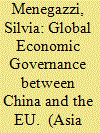

|
|
|
|
|
| Summary/Abstract |
The recent establishment of the Asian Infrastructure Investment Bank (AIIB), the initiative launched by the People’s Republic of China in 2013 underpins Beijing’s intensions to promote its own narrative about global economic governance (GEG) as well as China’s readiness to play a far more proactive role at the international level. In the age of global power shifting and with 14 EU member-states part of the AIIB, the European Union (EU) necessitates to engage further with China, in particular, within the context of multilateral institutions. This article analyses the impact of China’s evolving global governance policies on the EU. China’s and EU’s approaches to the reform of global governance present both differences and similarities, yet, the article highlights EU’s needs to make sense to what extent China’s growing ascent in the realm of global governance is reshaping world’s regional and global architectures vis-à-vis financial multilateral cooperation.
|
|
|
|
|
|
|
|
|
|
|
|
|
|
|
|
| 8 |
ID:
152946


|
|
|
|
|
| Summary/Abstract |
As the importance of China in the global economy has grown, changes in its domestic economy have increasing impact in the EU. However, a key factor is no longer the simple fact of China’s rise, but that its economy is undergoing rapid change through structural transition. Many scholars argue that the interaction of political and economic dimensions is a significant factor in the distribution of economic benefits of the EU’s relations with China among Member States. However, underlying these bilateral aspects of the relationship are domestic economic policies and structures both in the EU and China. In the future, domestic policy in China will have a greater effect in determining the structure of the bilateral economic relationship. These domestic policy dimensions outweigh any direct political intervention in the bilateral relationship. The increasing complexity resulting from structural change in China is likely to create redistribution in the relationship with the EU, notably among Member States. This “new normal” stage in China’s rise will create new winners and losers in the EU, with differentiated interests.
|
|
|
|
|
|
|
|
|
|
|
|
|
|
|
|
| 9 |
ID:
152940
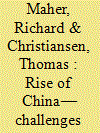

|
|
|
|
|
| Summary/Abstract |
China’s growing power and influence raise important and inescapable questions for countries and societies around the world, not least for Europe. A rising China offers opportunities for greater cooperation, both bilaterally and in the context of old and new multilateral institutions, yet also carries inherent risks for the European Union (EU), not least in the way in which it may make it (even) more difficult to manage the relations with other global powers while also maintaining unity among EU member states. This special issue examines Europe’s response to the steady and dramatic rise of China over the past two decades. In particular, it explores the challenges as well as the many instances of engagement that define their relations today across a number of policy areas, including economic, diplomatic, and security relations. The contributions to this special issue demonstrate the varied, multi-faceted and to some extent contradictory nature of EU-China relations. The two sides are in an ever-closer economic embrace, yet they remain distant and occasionally antagonistic with respect to security concerns or normative discourses.
|
|
|
|
|
|
|
|
|
|
|
|
|
|
|
|
|
|
|
|
|